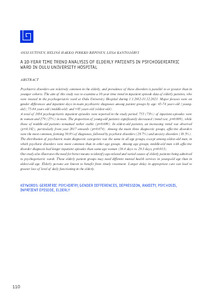A 10-year time trend analysis of elderly patients in psychogeriatric ward in Oulu University Hospital
Sutinen, Ossi; Hakko, Helinä; Riipinen, Pirkko; Kantojärvi, Liisa (2023-10-31)
Sutinen, Ossi
Hakko, Helinä
Riipinen, Pirkko
Kantojärvi, Liisa
Psykiatrian Tutkimussäätiö
31.10.2023
Sutinen, O., Hakko, H., Riipinen, P. & Kantojärvi, L. (2023). A 10-year time trend analysis of elderly patients in psychogeriatric ward in Oulu University Hospital. Psychiatria Fennica, 54, 110-123, https://www.psykiatriantutkimussaatio.fi/wp-content/uploads/2023/10/Psychiatria_Fennica-2023-Sutinen.pdf
https://creativecommons.org/licenses/by/4.0/
© Authors 2023. Psychiatria Fennica uses an open access policy with an open license (Creative Commons) allowing for immediate free access to the work and permitting any user to read, download, copy, distribute, print, search, or link to the full texts of articles, crawl them for indexing, pass them as data to software, or use them for any other lawful purpose.
https://creativecommons.org/licenses/by/4.0/
© Authors 2023. Psychiatria Fennica uses an open access policy with an open license (Creative Commons) allowing for immediate free access to the work and permitting any user to read, download, copy, distribute, print, search, or link to the full texts of articles, crawl them for indexing, pass them as data to software, or use them for any other lawful purpose.
https://creativecommons.org/licenses/by/4.0/
Julkaisun pysyvä osoite on
https://urn.fi/URN:NBN:fi:oulu-202401231417
https://urn.fi/URN:NBN:fi:oulu-202401231417
Tiivistelmä
Abstract
Psychiatric disorders are relatively common in the elderly, and prevalence of these disorders is parallel to or greater than in younger cohorts. The aim of this study was to examine a 10-year time trend in inpatient episode data of elderly patients, who were treated in the psychogeriatric ward at Oulu University Hospital during 1.1.2012-31.12.2021. Major focuses were on gender differences and inpatient days in main psychiatric diagnoses among patient groups by age: 65-74 years old (young- old), 75-84 years old (middle-old) and >85 years old (oldest-old).
A total of 1034 psychogeriatric inpatient episodes were reported in the study period. 755 (73%) of inpatient episodes were in women and 279 (27%) in men. The proportion of young-old patients significantly decreased (trend test, p=0.009), while those of middle-old patients remained rather stable (p=0.689). In oldest-old patients, an increasing trend was observed (p=0.182), particularly from year 2017 onwards (p=0.074). Among the main three diagnostic groups, affective disorders were the most common, forming 50.8% of diagnoses, followed by psychotic disorders (28.7%) and anxiety disorders (10.5%). The distribution of psychiatric main diagnostic categories was the same in all age groups, except among oldest-old men, in which psychotic disorders were more common than in other age groups. Among age groups, middle-old men with affective disorder diagnosis had longer inpatient episodes than same age women (36.4 days vs. 28.3 days, p=0.013).
Our study also illustrates the need for better means to identify age-related and varied causes of elderly patients being admitted to psychogeriatric wards. These elderly patient groups may need different mental health services in young-old age than in oldest-old age. Elderly persons are known to benefit from timely treatment. Longer delay in appropriate care can lead to greater loss of level of daily functioning in the elderly
Psychiatric disorders are relatively common in the elderly, and prevalence of these disorders is parallel to or greater than in younger cohorts. The aim of this study was to examine a 10-year time trend in inpatient episode data of elderly patients, who were treated in the psychogeriatric ward at Oulu University Hospital during 1.1.2012-31.12.2021. Major focuses were on gender differences and inpatient days in main psychiatric diagnoses among patient groups by age: 65-74 years old (young- old), 75-84 years old (middle-old) and >85 years old (oldest-old).
A total of 1034 psychogeriatric inpatient episodes were reported in the study period. 755 (73%) of inpatient episodes were in women and 279 (27%) in men. The proportion of young-old patients significantly decreased (trend test, p=0.009), while those of middle-old patients remained rather stable (p=0.689). In oldest-old patients, an increasing trend was observed (p=0.182), particularly from year 2017 onwards (p=0.074). Among the main three diagnostic groups, affective disorders were the most common, forming 50.8% of diagnoses, followed by psychotic disorders (28.7%) and anxiety disorders (10.5%). The distribution of psychiatric main diagnostic categories was the same in all age groups, except among oldest-old men, in which psychotic disorders were more common than in other age groups. Among age groups, middle-old men with affective disorder diagnosis had longer inpatient episodes than same age women (36.4 days vs. 28.3 days, p=0.013).
Our study also illustrates the need for better means to identify age-related and varied causes of elderly patients being admitted to psychogeriatric wards. These elderly patient groups may need different mental health services in young-old age than in oldest-old age. Elderly persons are known to benefit from timely treatment. Longer delay in appropriate care can lead to greater loss of level of daily functioning in the elderly
Kokoelmat
- Avoin saatavuus [32523]

